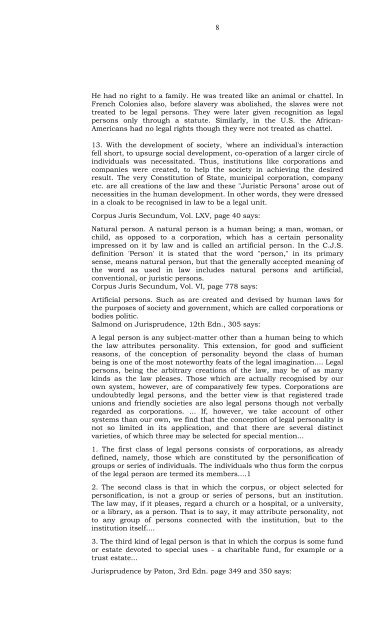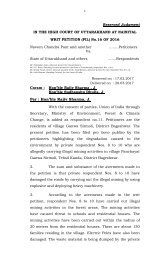You also want an ePaper? Increase the reach of your titles
YUMPU automatically turns print PDFs into web optimized ePapers that Google loves.
8<br />
He had no right to a family. He was treated like an animal or chattel. In<br />
French Colonies also, before slavery was abolished, the slaves were not<br />
treated to be legal persons. They were later given recognition as legal<br />
persons only through a statute. Similarly, in the U.S. the African-<br />
Americans had no legal rights though they were not treated as chattel.<br />
13. With the development <strong>of</strong> society, 'where an individual's interaction<br />
fell short, to upsurge social development, co-operation <strong>of</strong> a larger circle <strong>of</strong><br />
individuals was necessitated. Thus, institutions like corporations and<br />
companies were created, to help the society in achieving the desired<br />
result. The very Constitution <strong>of</strong> State, municipal corporation, company<br />
etc. are all creations <strong>of</strong> the law and these "Juristic Persons" arose out <strong>of</strong><br />
necessities in the human development. In other words, they were dressed<br />
in a cloak to be recognised in law to be a legal unit.<br />
Corpus Juris Secundum, Vol. LXV, page 40 says:<br />
Natural person. A natural person is a human being; a man, woman, or<br />
child, as opposed to a corporation, which has a certain personality<br />
impressed on it by law and is called an artificial person. In the C.J.S.<br />
definition 'Person' it is stated that the word "person," in its primary<br />
sense, means natural person, but that the generally accepted meaning <strong>of</strong><br />
the word as used in law includes natural persons and artificial,<br />
conventional, or juristic persons.<br />
Corpus Juris Secundum, Vol. VI, page 778 says:<br />
Artificial persons. Such as are created and devised by human laws for<br />
the purposes <strong>of</strong> society and government, which are called corporations or<br />
bodies politic.<br />
Salmond on Jurisprudence, 12th Edn., 305 says:<br />
A legal person is any subject-matter other than a human being to which<br />
the law attributes personality. This extension, for good and sufficient<br />
reasons, <strong>of</strong> the conception <strong>of</strong> personality beyond the class <strong>of</strong> human<br />
being is one <strong>of</strong> the most noteworthy feats <strong>of</strong> the legal imagination.... Legal<br />
persons, being the arbitrary creations <strong>of</strong> the law, may be <strong>of</strong> as many<br />
kinds as the law pleases. Those which are actually recognised by our<br />
own system, however, are <strong>of</strong> comparatively few types. Corporations are<br />
undoubtedly legal persons, and the better view is that registered trade<br />
unions and friendly societies are also legal persons though not verbally<br />
regarded as corporations. ... If, however, we take account <strong>of</strong> other<br />
systems than our own, we find that the conception <strong>of</strong> legal personality is<br />
not so limited in its application, and that there are several distinct<br />
varieties, <strong>of</strong> which three may be selected for special mention...<br />
1. The first class <strong>of</strong> legal persons consists <strong>of</strong> corporations, as already<br />
defined, namely, those which are constituted by the personification <strong>of</strong><br />
groups or series <strong>of</strong> individuals. The individuals who thus form the corpus<br />
<strong>of</strong> the legal person are termed its members....1<br />
2. The second class is that in which the corpus, or object selected for<br />
personification, is not a group or series <strong>of</strong> persons, but an institution.<br />
The law may, if it pleases, regard a church or a hospital, or a university,<br />
or a library, as a person. That is to say, it may attribute personality, not<br />
to any group <strong>of</strong> persons connected with the institution, but to the<br />
institution itself....<br />
3. The third kind <strong>of</strong> legal person is that in which the corpus is some fund<br />
or estate devoted to special uses - a charitable fund, for example or a<br />
trust estate...<br />
Jurisprudence by Paton, 3rd Edn. page 349 and 350 says:



